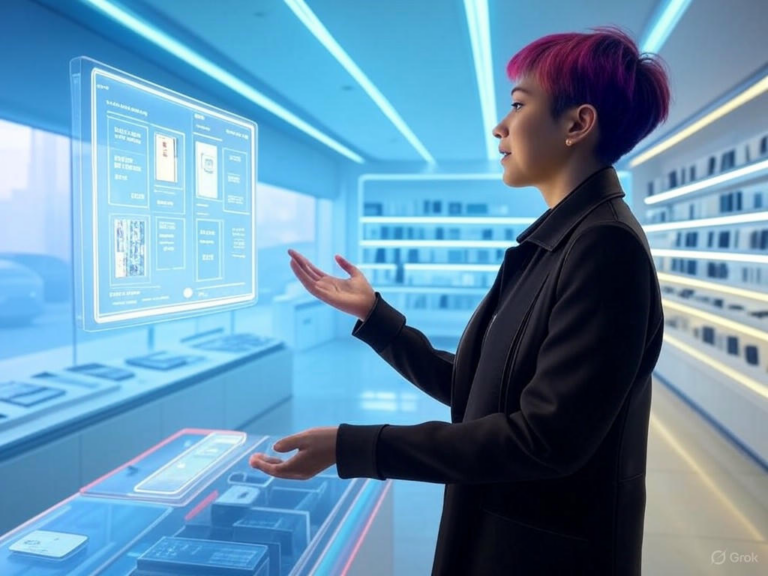
Generative AI Scaling: IBM’s New Hybrid Technologies for Enterprises
IBM’s Innovative Approach to Generative AI for Enterprise Transformation
In the fast-paced world of generative AI, IBM is leading the charge with fresh developments in early 2025. They’re building out hybrid cloud features and teaming up with partners to meet the surge in demand for reliable AI tools that businesses can trust. This push highlights IBM’s dedication to helping companies from various sectors adapt to AI while keeping up with regulations.
Think of IBM’s “hybrid by design” as a smart blueprint for flexibility. It lets enterprises choose where to run their workloads based on factors like security, speed, and costs, making generative AI more accessible and efficient for real-world use.
Expanding GPU and Accelerator Partnerships for Scaling Generative AI
High-performance tech is essential for pushing generative AI forward in business settings. IBM is stepping up by broadening its partnerships for GPUs and accelerators, aiming to handle demanding AI tasks without breaking the bank.
Have you ever wondered how companies speed up AI projects? IBM’s latest moves include rolling out the AMD Instinct™ MI300X GPU on IBM Cloud, which will soon integrate with the watsonx platform and Red Hat AI tools. They’re also adding support for AMD Instinct MI210 GPUs in IBM Fusion HCI for budget-friendly options, alongside next-gen NVIDIA GB200 systems to boost their Granite models.
Other highlights? New backing for NVIDIA H200 GPUs and Intel® Gaudi® 3 AI accelerators. This mix builds on IBM’s strong foundation with NVIDIA, giving businesses plenty of choices to scale generative AI effectively.
Strategic Partnerships Driving Agentic AI Innovation
IBM and Oracle: A Powerful Collaboration
On May 6, 2025, IBM teamed up with Oracle to bring watsonx capabilities to Oracle Cloud Infrastructure. This move is all about unlocking generative AI‘s potential through multi-agent systems that boost productivity.
As AI agents simplify complex tasks with user-friendly interfaces, this partnership arrives at the perfect time. Greg Pavlik from Oracle emphasized how seamless AI integration can transform businesses, drawing on decades of collaboration between the two companies.
It’s like having a team of smart assistants working across your operations—what could that do for your efficiency?
Watsonx Orchestrate for Multi-Agent Workflows
By July 2025, IBM’s watsonx Orchestrate will be available on Oracle Cloud, working alongside Oracle’s AI tools. This setup helps enterprises connect AI agents with custom apps and data sources.
Early applications focus on HR, where these agents handle inferencing right on Oracle Cloud. Imagine streamlining employee onboarding or performance reviews with generative AI doing the heavy lifting.
AWS and IBM Collaboration
IBM’s ongoing work with AWS is adding more agentic AI features, fitting into a broader multi-cloud strategy. This ensures companies can access top-tier AI no matter where their data lives.
These partnerships make scaling generative AI less about choosing one platform and more about seamless integration. What if your business could innovate faster by leveraging the best of both worlds?
Enterprise-Ready AI Agents and Tools
Watsonx Orchestrate: Building and Managing AI Agents
At IBM’s THINK conference, they showcased tools like watsonx Orchestrate, designed to make deploying generative AI straightforward. You can create custom agents in minutes, using no-code options for quick setups or pro-code for deeper tweaks.
Pre-built agents cover areas like HR and sales, and they integrate with over 80 apps from giants like Adobe and Microsoft. Plus, features for monitoring performance keep everything in check, ensuring secure and governed AI use.
The new Agent Catalog simplifies finding the right tools for your needs. It’s a game-changer for businesses looking to scale generative AI without the usual headaches.
Practical Applications of Generative AI in Enterprises
Marketing and Customer Engagement
Generative AI is revolutionizing marketing by generating tailored content for blogs, emails, and ads on the fly. This means personalized visuals and messages that adapt in real-time to your audience.
Advanced chatbots powered by this technology can handle inquiries and even take actions, making customer interactions feel more human. How might this level of personalization transform your brand’s engagement?
Software Development and Application Modernization
In coding, generative AI automates writing new code and speeds up updating old systems for hybrid clouds. It’s like having an extra developer on your team for repetitive tasks.
This can cut modernization time dramatically, letting your IT pros focus on innovation. Consider a scenario where legacy apps get a quick AI-facelift—what new opportunities could open up?
Administrative Process Automation
From drafting contracts to revising invoices, generative AI handles the boring paperwork so employees can tackle strategic work. This speeds up processes in HR, legal, and finance alike.
It’s about freeing up time for what matters most. A tip: Start small, like automating routine emails, and watch how it scales across your operations.
Scientific Research and Healthcare
In research, generative AI proposes fresh solutions to tough problems, while in healthcare, it creates synthetic images for better diagnostics. This could accelerate discoveries and improve patient outcomes.
Imagine AI helping doctors spot issues faster—it’s a real-world application with huge potential. For your organization, where could generative AI make the biggest impact?
SEO Considerations for Generative AI Content
Content Generation and Optimization
AI tools can draft outlines or optimize content for better SEO, but don’t let them replace your unique voice. Use generative AI to suggest links or refine drafts, then add your personal touch for authenticity.
This hybrid approach ensures engaging, human-centric content. A quick strategy: Always review AI suggestions to infuse emotional depth and real examples.
Technical SEO and Automation
Automate site audits with AI to handle schema markup and ranking checks efficiently. This lets SEO experts focus on big-picture strategies rather than manual tasks.
When scaling generative AI in your workflow, it streamlines processes without losing accuracy. What if AI handled the routine, freeing you for creative SEO tactics?
The AI Crawling Dilemma
Deciding whether to block AI bots from your site is tricky. If your content is behind a paywall, it might protect your assets, but if you thrive on search visibility, allowing crawls could boost your brand.
Weigh the pros and cons based on your business model. For instance, being featured in AI-generated answers can drive more traffic—something to consider when optimizing for generative AI.
IBM’s Granite: Enterprise-Grade Foundation Models
At the heart of IBM’s strategy are the Granite models, open and reliable AI foundations perfect for business needs. They cover language, code, and more, helping enterprises scale generative AI applications.
Powered by advanced NVIDIA systems, these models ensure top performance. It’s like having a customizable AI toolkit that’s built for security and efficiency.
Edge-to-Cloud AI Solutions
IBM’s partnership with Qualcomm, announced in February 2025, brings generative AI to edge devices and clouds. This means deploying AI where it’s needed most, from remote sites to central servers.
For businesses, this offers unparalleled flexibility. Picture running AI on factory floors or in mobile apps—it’s about making technology work everywhere.
Conclusion: The Future of Enterprise AI
IBM’s efforts in hybrid technologies are paving the way for scalable generative AI, with partnerships that address real business challenges. As AI evolves, blending these tools with strategic decisions will be key to success.
If you’re starting your AI journey, consider IBM’s hybrid approach for smarter workload choices. It could be the edge your enterprise needs.
We’d love to hear your thoughts—how is generative AI shaping your business? Share in the comments, explore more on our site, or check out related posts for deeper insights.
References
- IBM’s announcements on AI collaborations: IBM Newsroom
- IBM and Oracle partnership: IBM Newsroom
- AWS and IBM collaboration: IBM Newsroom
- IBM’s AI solutions for businesses: ZDNet Article
- Generative AI topics: IBM Think
- SEO and generative AI: Neil Patel Blog
- Qualcomm and IBM partnership: Qualcomm News
- AI writing tools: Ry Rob’s Guide







